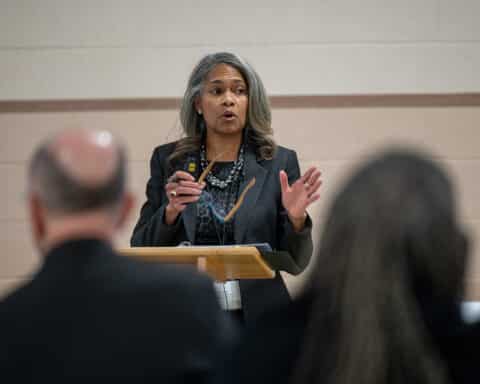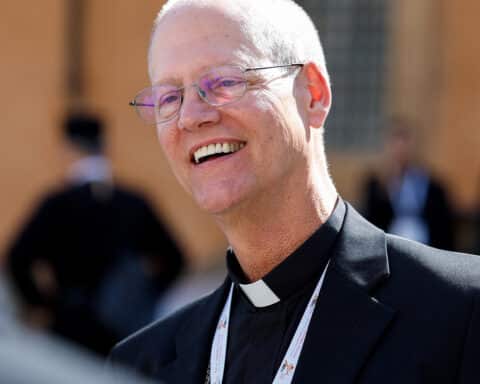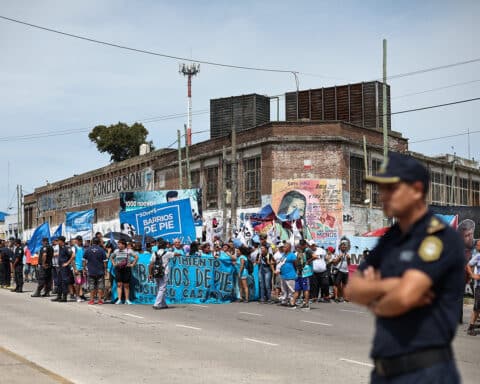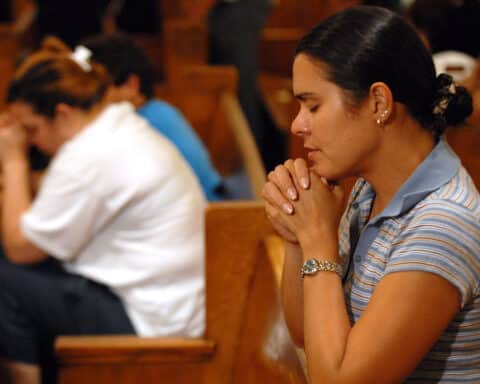Msgr. Charles Kosanke has told his parish staff that he can keep them employed full-time until April 6. After that, he has no idea.
“We certainly don’t want to hurt them, but sadly it may come to that in order to keep the lights on,” said Msgr. Kosanke, the pastor of Detroit’s two oldest parishes, the Basilica of St. Anne and Most Holy Trinity Church.
Msgr. Kosanke has the same dilemma that thousands of other pastors across the United States are now facing as public Masses across the country have been canceled because of the novel coronavirus pandemic. They rely on the weekend Mass collections to make ends meet. Without the Sunday collection basket, their parishes will soon not have enough money to pay the bills.
“A parish can probably take a hit in their offertory for two or three weeks,” Msgr. Kosanke told Our Sunday Visitor. “But beyond that, it becomes really unsustainable.”
Communication is key
The highly contagious virus, which can be especially deadly to older adults and those with weakened immune systems and underlying health problems, is challenging pastors and Church leaders everywhere to figure out how to best provide spiritual support and keep crucial ministries operating in a time when their major source of revenue has been crippled.
|
Want more coverage on coronavirus from a perspective of faith? Sign up for our daily newsletter.
|
The crisis is forcing priests throughout the United States to consult the financially savvy parishioners on their parish finance councils. From Detroit to Dallas, pastors are being called to exercise leadership and communicate their parishes’ fiscal needs to the flock in an open and transparent manner.
“Every pastor has to be communicating many times more than what they were before with their people,” said Matt Manion, the faculty director of the Center for Church Management at Villanova University’s School of Business.
“I think the people need to hear from their pastor, if not daily then pretty close to it,” said Manion, who also told Our Sunday Visitor that the first thing a pastor should do, if he hasn’t done so already, is to have an emergency phone call with his parish finance council.
“And if they’re not taking a look at what their cash flow looks like for the next three to six months, that’s the first exercise I would have them all do,” Manion said. “They should understand what their situation is and make adjustments, and start planning for those now.”
Mario Enzler, the director of Master of Science in Ecclesial Administration and Management at The Catholic University of America’s Busch School of Business, told Our Sunday Visitor that a “good, dynamic” finance council is crucial right now to advise pastors on whether they should be paying certain bills first before trying to make payroll.
“Many dioceses have emergency funds. This is the time that they might dip into it,” said Enzler, a former Swiss banker and tax fiduciary who served in the Vatican’s Swiss Guard during Pope St. John Paul II’s pontificate.
Enzler told Our Sunday Visitor that he believes parishes everywhere will experience immediate cash-flow problems, though he struck an optimistic tone when taking a long-term view, adding that he believes the clergy and laity will step up.
“I’ve been telling priests, you have to be extremely entrepreneurial right now, and many of the young priests are doing that,” Enzler said. “They are celebrating Mass and streaming them live. They’re streaming themselves in their private chapels, in front of the Blessed Sacrament. They’ve created new Facebook pages and WhatsApp groups.
“This is an opportunity for the laity to step up, and they will if the priests communicate that need to them,” Enzler added.
Finding solutions
But in the short term, pastors have tough decisions to make. In the last weekend before the Archdiocese of Atlanta canceled all public Masses until at least early April, Sts. Peter and Paul Church in Atlanta collected about $4,000. The weekend offertory is usually around $10,000.
“Where’s that missing $6,000 coming from? The answer is, it’s not. For the next three weekends at least, there’s no Mass, which means no basket,” said Father Bryan Small, pastor of Sts. Peter and Paul.
Father Small told Our Sunday Visitor that he and his finance council have decided, for now, not to pay the parish’s regular assessments to the archdiocese. After taking salaries, utilities and supplies into account, Father Small estimated that his 750-family parish needs about $25,000 a month to stay open.
“So I’m going to my top 25 givers and asking them, ‘Are you in a position to be able to offer an emergency alm of $1,000 to get us through the month?'” said Father Small, who has also asked his parishioners to switch to online giving, with mixed results.
“We’ve had online giving for years, but much to my dismay, only a fraction use it,” Father Small said.
Most parishes that have online giving platforms still expect to take a major financial hit because the vast majority of parishioners who contribute — especially the older generations — still prefer to give cash or a check in envelopes.
“We’re pushing online giving, but the reality is you’re not gonna push those percentages up significantly, because that’s not the way our people operate,” said Father Joshua Whitfield, the pastor of St. Rita Church in Dallas.
Kyle Hamilton, the CEO of OSV, which offers online giving services for parishes, said OSV recently has been seeing an increased number of phone calls and applications from parishes interested in implementing a remote donation option for parishioners.
“In this time, the online giving platform becomes much more functional when churches are closed and you can’t do anything on site,” Hamilton said, adding that “the urgency factor is definitely there. There is a need to maintain the offertory at some level.”
‘A very difficult time’
Father Whitfield told Our Sunday Visitor that he has been implementing several cost-cutting measures in recent days, including shutting down the electricity, air conditioning and HVAC systems to all parts of the parish campus that are not being used. He has also cut contract services and is considering reducing the parish’s hours of operation.
“We’re doing all we can do to cut material spending before we look at employees, which is obviously the just thing to do,” said Father Whitfield, who added that any pastor nowadays has to prioritize institutional survival above all else.
“Any institution in the Church in the United States that is not cutting spending is not being responsible,” Father Whitfield said.
At the same time, parishioners themselves are experiencing financial difficulties, especially those who have been or expect to be laid off soon because of the coronavirus forcing their businesses to close. Even with online giving and creative appeals from their pastors, many of them will not have as much money to give to the Church.
“They still have to pay their mortgages, car payments and utilities. They need to keep the lights on at home and feed their families” Msgr. Kosanke said of his Detroit parishioners, many of whom work in restaurants and other affected service industries.
“It’s a very difficult time,” Msgr. Kosanke said. “But it’s a time for the Church not to retreat but to be out in front. It’s time for the Church to be a leader and a consoler, and that’s what we’re trying to do. We’re trying to exercise the role of the Church in the midst of all this tragedy.”
Brian Fraga is a contributing editor for Our Sunday Visitor.





